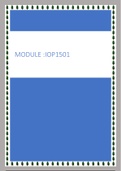MODULE :IOP1501
,IOP1501 Exam
Notes eBook
Contains:
• Exam Study Notes
• eBook Psychology in the work
context 5th Ed
• Discussion Slides
,MAY/JUNE 2020 EXAM SCOPE NOTES
Chapters 2,4,5,6,7.8 and 9
CHAPTER 2 :
Exploring the Meta-Theory of Industrial and Organisational Psychology
Throughout the ages, ever since the dawn of humankind, work has been central in the
lives of people. This is true whether we were/ are gathers or hunters, farmers or
herdsmen, factory workers or knowledge workers.
In IOP human work is studied, from a psychological perspective, in all of its various
manifestations: individual, team and organisational work. In essence, IOP deals with: (1)
the working person; (2) his/her work setting; and (3) how to establish and sustain the
best match (or fit) between the working person and his/her work setting in order to
bring about productive, satisfying and meaningful work which delivers something of
value. The objectives of studying working individuals and organisational behaviour are
achieved in IOP through using and applying psychological knowledge in the world of
work. Psychology concerns the study of human mental processes and behaviour.
Ever since it was founded over a hundred years ago, IOP as a science and practice has
been – and is – affected by many different thinking frameworks (which is called the
meta-theory of IOP in this chapter). One of these thinking frameworks is the schools of
thought in Psychology, which deal with different ways of looking at the human psyche
(see table 2.2 in Bergh & Geldenhuys, 2013). In other sections you will also find other
thinking frameworks to be considered, that is, stances on work (table 2.1), human being
stances (table 2.3), societal stances (table 2.4), scientific frameworks (table 2.5),
ideological stances (table 2.7). See also table 2.8 for a summarised meta-theoretical
perspective.
This chapter is structured as follows:
• Firstly, the so-called four worlds of IOP, and the importance of the meta-theory of IOP,
are discussed (section 2).
• Secondly, the meta-theory of IOP is mapped by identifying the building blocks of the
meta-theoretical landscape which constitutes World 2 of IOP (section 3) (see figure 2.3);
• Thirdly, each building block of the meta-theoretical landscape is discussed (section 4).
• Fourthly, based on the previous section an overview of the past, current and emerging
• meta-theoretical perspectives (or thinking framework) informing the science and
practice of
• IOP (section 5) is given.
2.2 The four worlds making up IOP
, 2.2 The four worlds making up IOP and the importance of the meta-theory of IOP
This section presents the four worlds that make up IOP. When you work through this section, you
have to:
• understand, in the first instance, the four worlds that make up IOP.
• know which one of these worlds is appropriate to give one a “view over” or a “helicopter” view of
the science and practice of IOP.
• understand why it is of critical importance to adopt such a “view over” or “helicopter” view of the
field.
2.2.1 The four worlds of IOP
The field of IOP consists of four interdependent BRIEF DESCRIPTION
worlds: WORLD
(1) The personal world This world refers to current and future Industrial
and Organisational psychologists, with their
diverse profiles, who (as a collective) form the
community of practice of IOP. In other words,
this world is made up of the persons who are
involved in the field of IOP.




